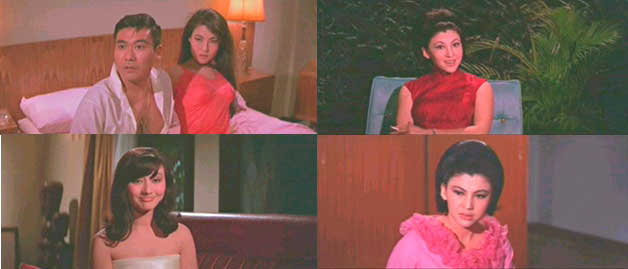Madam Slender Plum
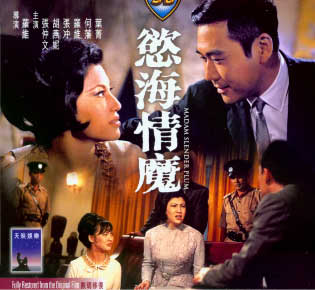
Director: Lo Wei
Year: 1967
Rating: 5.5
After having recently
seen Paul Chang Chung play the hero in two films – “The Golden Buddha” and
“The Black Falcon” – it was more than a bit surprising to see him get killed
in the first minute of this film – but there he was with a knife in his back
and clearly no tomorrows waiting for him. As it turns out though his character
is far from a hero and as the flashback evolves you are more than happy to
see him meet up with the wrong end of a sharp blade. This was directed by
Lo Wei – one of the Shaw’s most prolific directors before moving on to direct
Bruce Lee and Jackie Chan for other companies – and it has a clear sleek design
that is pleasing to the eye, but as in many of his films the narrative feels
sluggish and never gathers momentum. The main problem though is that this
film fails to go where it needs to – it holds back in middle class safety
– it takes the shell of a classic Hollywood film noire but takes out the
noire.
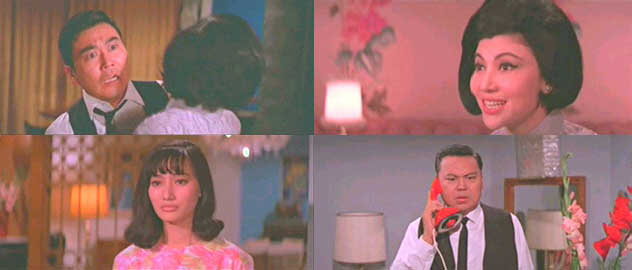
So Chung lays dead and his killer, the classy Diana Chang Chung-wen, regains
her composure, gets every hair back in place and calmly calls the police
to tell them that she just committed murder. The inspector (Tien Feng) asks
her why she did it and she begins to tell the story of what brought her to
this place. She was happily married to Lo Wei with two daughters that they
loved – but tragedy strikes when one of the daughters dies and Lo Wei loses
all their money and takes a powder. Now without any means of support Chang
has to move into a small apartment with her daughter (Jenny Hu) and look
for a way to make a living. She finds a job as a waitress to put food on
the table, but this lowly occupation doesn’t sit well with Jenny who is used
to her high status and nice clothes. But the mother is determined to do whatever
she can to give her daughter a good life so that she wants for nothing –
except maybe a little attention.
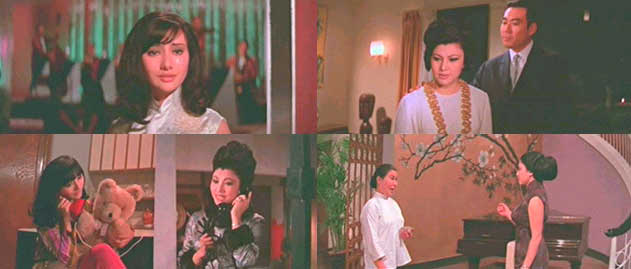
Soon with the financial help of her husband’s business partner (Yeung Chi
Hing), she opens a ritzy nightclub and it’s a roaring success. Soon she and
her daughter are back in their old home, but she has become so busy that
she has little time to spend with Jenny. Any time Jenny complains, Diana
just asks her what she can buy her. On the scene comes Paul – an old boyfriend
of Diana’s from long ago – and he prowls around sniffing the aroma of money
in the air. With a sheen of insincerity that crawls over him like a garden
lizard, he tries to cozy up to Diana like a hundred dollar bill, but when
she spurns his advances he turns his attentions to the 18-year old Jenny
instead and finds her immaturity an easier target. Diana tries to warn her
daughter but Jenny throws it back in her face like a dry martini. Appearing
also in a small cameo is the always delicious Angela Yu Chien as a plaything
of Paul's.
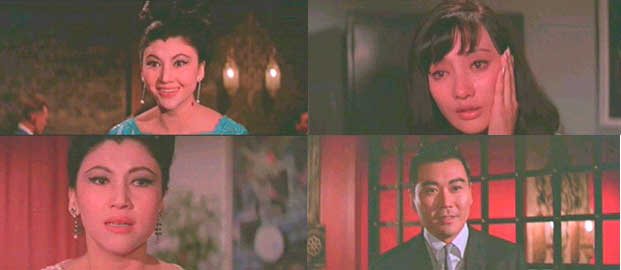
This may be ringing bells in your head. This is largely a remake of the 1945
film, “Mildred Pierce”, with Joan Crawford and Ann Blyth – but though the
plot is very similar this movie has let out all the blood. The tragedy of
“Mildred Pierce” is that no matter how much Mildred does for her daughter,
its never enough – Veda is bad to the bone and Mildred is never able to see
this or accept it until she is crushed by it. She just works harder, makes
more money and translates this into love for her daughter, but the bleak
ending seems to mock the capitalistic system as well as the American dream.
They just don’t have the nerve in this 1966 Shaw film to make the daughter
that bad - Jenny Hu’s character is spoiled but basically a good girl gone
astray. Perhaps they thought a daughter being so disrespectful of her mother
would not play well with a Chinese audience, but by greatly moderating her
meanness and sexuality they rob the film of its reason for being.
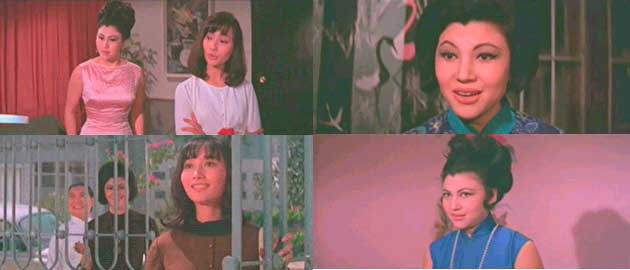
The performances from both Paul Chang Chung and Diana Chang are quite good
– he is a wonderful nasty sleaze behind the polished front and Diana has
a great sense of authority and tenderness in her. As she moves first down
the social ladder and then back up, one can see her character change in the
way she holds herself, the way she walks and how her makeup is applied –
when she patrols the nightclub and greets the customers it has a real feel
of vérité to it. She also looks great in her assortment of
cheongsams that are built to accentuate her womanly curves and make her chest
look like its ready for takeoff into space exploration. With a more focused
and nastier script, she could have rocked this film.
